Italy Crashes England's Homecoming, Caps Remarkable Turnaround to Win Euros

LONDON — Penalties, again.
All that talk of bold new eras, all the research, all the plans, all the change of moods, and in the end it turned out Gareth Southgate’s England was undone by two very familiar failings: the tendency to drop deep in defense of a lead, and the inability to score in a shootout. And so Italy, having become the first side in European Championship history to win two penalty shootouts in the same tournament, was crowned European champion for a second time, and the first time since 1968, a 3–2 winner in the shootout following a 1–1 draw. Less than four years after Italy failed to qualify for the World Cup, manager Roberto Mancini and his side have achieved something remarkable.
As England’s players sadly traipsed around the pitch and accepted the sympathetic applause, in Wembley’s West Stand, the Italy fans, carefully segregated into two sections—those who had come in a bubble from Italy, and those based in the U.K.—celebrated wildly. Mancini’s side is now unbeaten in 34 games, one shy of the international record and something unthinkable late in 2017 when it failed to beat Sweden in a playoff to make it to the 2018 World Cup. For captain Giorgio Chiellini, who played in the first game at the new Wembley for Italy’s Under-21 side in 2007, this represents a remarkable finale to an exceptional career. (It's expected, though not guaranteed, that he will retire after the Euros.)
Gianluigi Donnarumma, the young goalkeeper, was named player of the tournament, and that seemed justified as he stopped England's last two penalties and a decisive one vs. Spain in the semifinals. It was his save from Romelu Lukaku early in the quarterfinal win over Belgium that will stand out, though. He is just 22. Leonardo Bonucci, 12 years his senior, didn’t just score the equalizer that gave Italy new life, but he kept Harry Kane quiet most of the night. Having spent the last six weeks sequestered in a hotel with Chiellini, his great partner for both club and country, they will now evidently go on holiday together with their families. But beyond the efforts from those on the field both young and old, most of all, this was a triumph for Mancini.
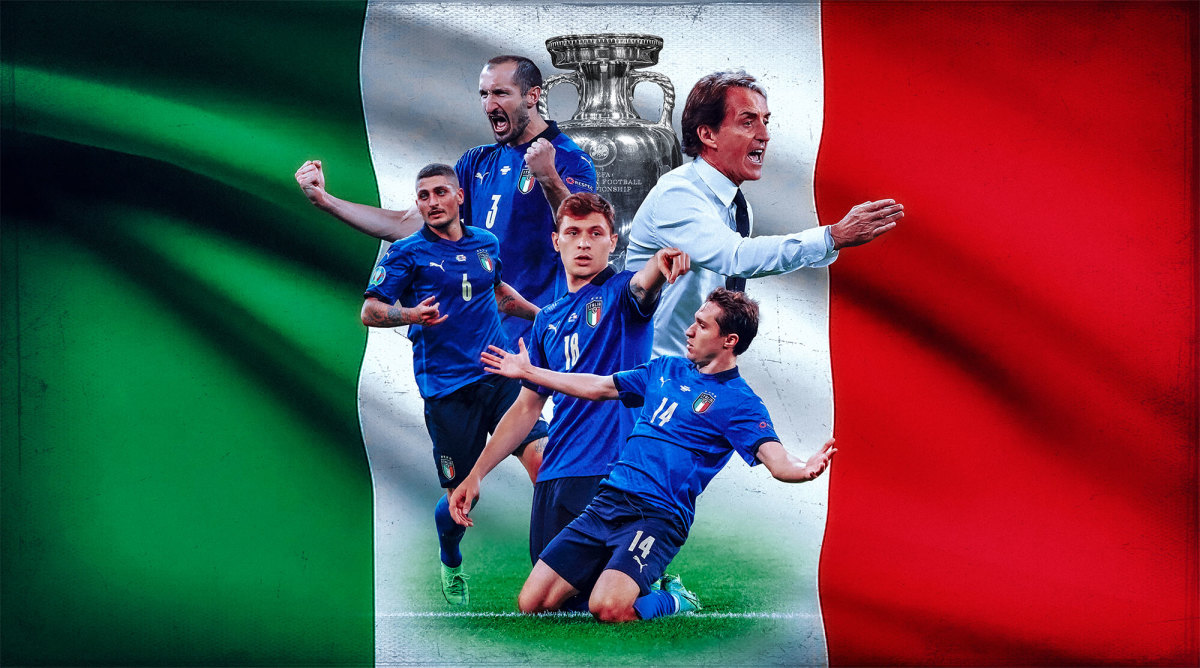
There are positives also for England to take in defeat, although other old problems reared their head, and not only those that pertained to the players and staff. Events off the pitch dominated the buildup. Olympic Way, the wide boulevard that stretches from Wembley Park tube station to the stadium, was packed beginning in the early afternoon. Four hours before kickoff, the ground was awash with spilled beer, and littered with broken glass and cans. Even then there was a clear edge to the atmosphere, bottles and traffic cones randomly being lobbed into the air. About two hours before kickoff came the first reports of the first lines of security being breached.
Several hundred people without tickets made it onto the stadium surroundings; despite initial denials, it was clear a number made it into the ground itself–just as well, perhaps, that COVID-19 restrictions meant 20,000 seats had been left empty. Even in the stadium corridors, the atmosphere was distinctly unpleasant with fights breaking out and projectiles being thrown. Surges of large groups past stewards suggested how many did not have tickets. For a country so used to hosting major sporting events, this represented a major loss of control. And for England it was reminder that there is still an element of its support that remains incorrigibly problematic: boorish, aggressive, drunken and violent.
On the pitch, control has been the overriding goal of Gareth Southgate all tournament. Seemingly accepting that he couldn’t hope to dominate possession against Italy in the way that Spain had, he set up as he had against Germany, in a 3-4-3, looking to ensure he always had a double pivot protecting his back three, with the wingbacks assigned to check Italy’s fullbacks, particularly Emerson Palmieri. But wingbacks can also give you an extra angle of attack, and two minutes in an England break led to Kieran Trippier crossing for Luke Shaw, who had initiated the move, sweeping in at the back post with an expert finish.
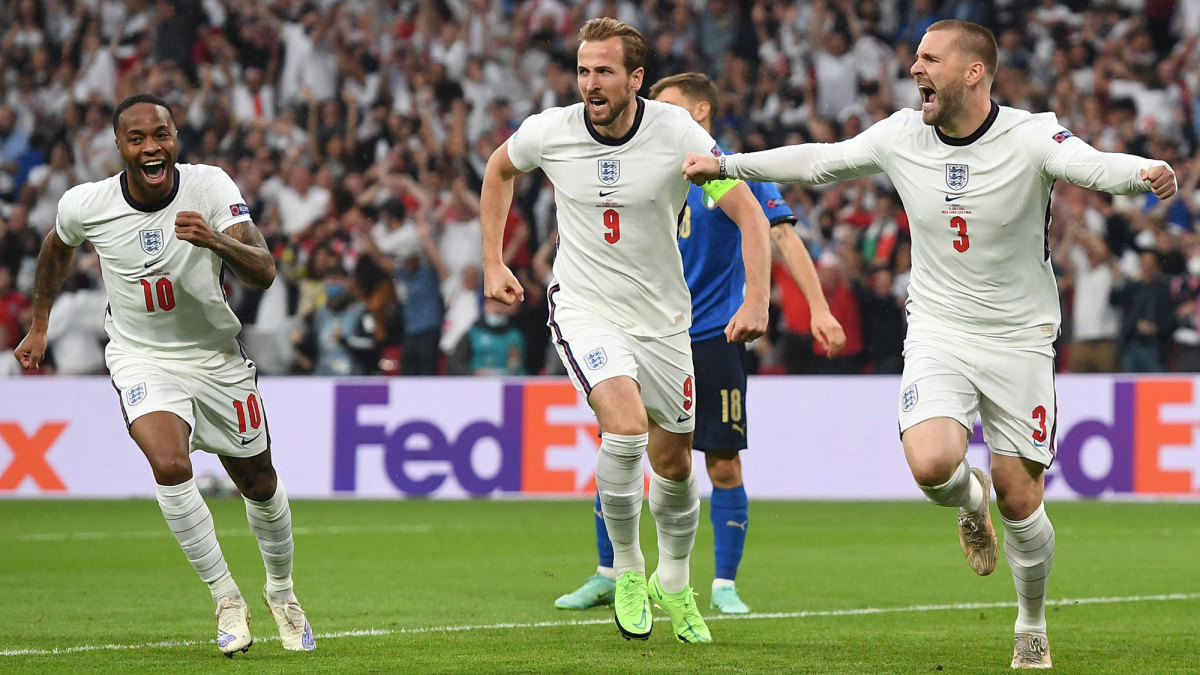
At this early juncture, England set about trying to control the game. This is new England, Southgate’s England: confident in its shape, confident in its tactical approach. For a time it worked. But slowly new England became old England. The ball wasn’t worked clear; it was belted forward. England got deeper and deeper. Italy constricted more and more, and eventually the goal came, with Bonucci forcing the ball over the line in a scramble following a corner.
Southgate promptly changed his shape back to the 4-3-3, and the game became more even again. But there was a certain narrative inevitability about it going to penalties. In theory, that should suit Southgate, the meticulous planner, but as he brought on Marcus Rashford and Jadon Sancho specifically to take kicks, the announcement of three minutes of injury time must have come as a grim shock. Suddenly, England had to play out the game in a loose 4-4-2 with Rashford a makeshift right back.
But that was a quirk. As was the fact that Rashford and Sancho both missed. Sometimes planning just runs into reality. There were questions, too, about the fact that Bukayo Saka, at 19, took the crucial final kick. But then if Rashford's penalty had not hit the post and gone in rather than bouncing wide, perhaps the other two, under less pressure, might also have scored.
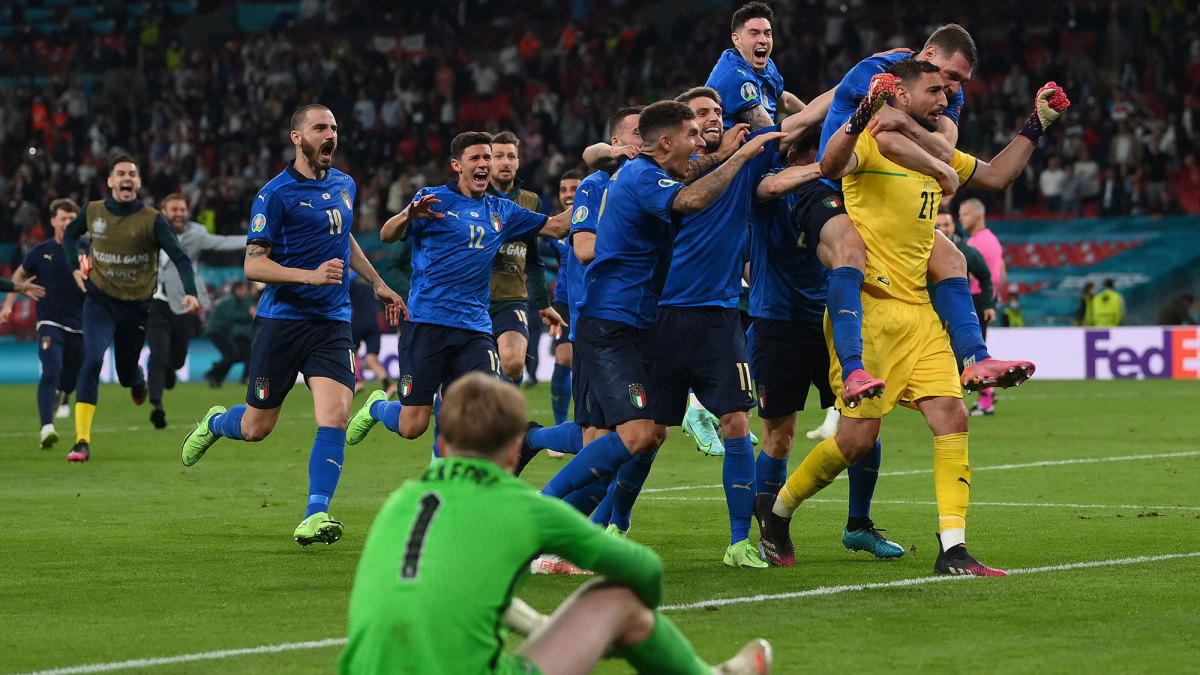
Despite the disappointment, the England national team is clearly in a far better position now than it was before Southgate took over. There was no one overwhelming moment of shame, rather an accumulation of failures that left the national team weirdly diminished, both central to the consciousness and yet oddly peripheral in that people had lost faith and love for it. The England story—as expressed in the song Three Lions—used to be about epic failure: the 3-2 defeat to West Germany in 1970; Diego Maradona’s two goals in 1986; the penalty shootout defeats to (West) Germany in 1990 and 1996; the operatic defeat on penalties to Argentina after David Beckham’s red card in 1998; Wayne Rooney’s broken metatarsal against Portugal in 2004. But it changed.
England became boring. It went out of tournaments almost unnoticed. The defeat to Iceland in Euro 2016, four days after the Brexit referendum led to the U.K. leaving the European Union, came as the nadir. Some portrayed it as a humiliation, but that only reflected the arrogance that had infected the English game. Iceland had been improving for four years and was at its apogee; England had been falling. The problem was that wasn’t a one-off shock; it was a defeat that had been coming.
English football needed rebuilding. But there had been talk of root-and-branch reforms for years. Nobody had any faith in them any more. They were just what England did: grind through qualifying, arrive at a tournament with inflated expectations, underperform, go out, conduct a review, repeat. But it turned out the reforms enacted after the embarrassment of World Cup 2010, when England was dismal in the group phase and then hammered 4–1 by a much smarter, slicker Germany, were bearing fruit.
The Elite Player Performance Plan had been introduced in 2011, rationalizing academy structures. Three years later came the England DNA project, which studied nine countries around the world and used those findings, along with a sense of the strengths of the English game, to formulate a style that would be taught at the national training base and coaching center at St George’s Park, Burton. For years England, obsessed by the club game, had not taken national youth football particularly seriously. And then in 2017, it won both the Under-17 and Under-20 World Cups. Sancho, Phil Foden and Dominic Calvert-Lewin were in those squads. The raw materials were there.
By then, Southgate had become national team manager—essentially by mistake. In the best English tradition, he is an accidental hero, the Under-21 coach drafted in when Sam Allardyce, who had been appointed to succeed Roy Hodgson after the Iceland debacle, was forced to resign following a newspaper sting that—in the cold light of day—turned out not to have revealed very much.
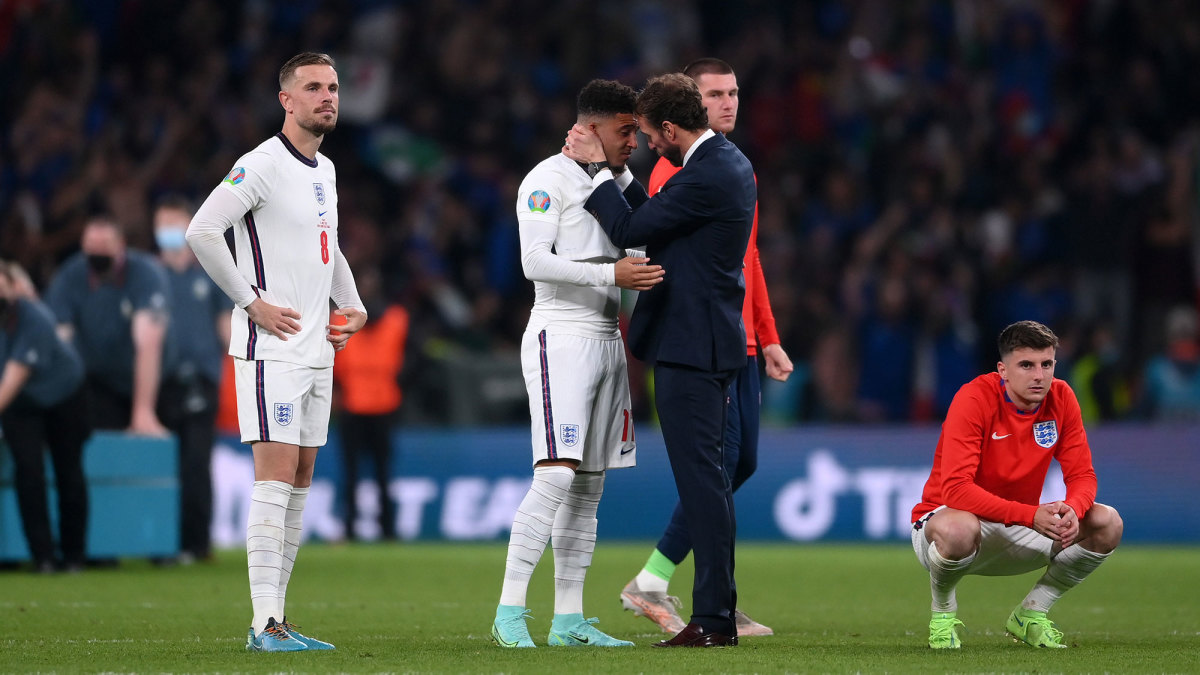
But Southgate was part of the DNA project. He understood it. He wasn’t trying to impose club ideas. He changed the atmosphere radically, worked on improving the squad’s relationship with the media and was tough on rooting out any suggestion of the club cliques that had undermined previous generations. When Raheem Sterling clashed with Joe Gomez in the canteen shortly after a Manchester City vs. Liverpool game, Southgate dropped him.
He had a squad big enough he could afford to be tough. When Foden and Mason Greenwood breached COVID-19 protocols in Iceland last year, they were dropped. But at the same time, he has protected his players from external threats. When players were racially abused in Bulgaria and Montenegro, Southgate discussed the issue with his players before agreeing to play on. Those conversations have led to the taking of the knee, despite criticism from politicians, a lack of support from the Prime Minister Boris Johnson and Home Secretary Priti Patel, and booing from a section of the England support.
The result has been an England that stands for more than its own self-interest and also a team that clearly enjoys each other’s company. Photographs of the players larking about in a pool with inflatable rainbow-maned unicorns have become a shorthand for that sense of togetherness. England duty is no longer a chore, and the result is that the shirt seems not to weigh so heavy on this generation.
At the same time, Southgate has reaped the benefit of the improvement in youth development. England has now followed France, Spain, Germany and Italy in effectively industrializing youth development. There will be ups and downs, fallow periods and times of plenty, but the supply should be much more consistent now. The Premier League, once seen as a problem because only 30% of its players are England-qualified, can now be regarded as the greatest finishing school in the world: 30% is still 70 English players playing every weekend.
Defeat does not end the sense of progress of invalidate the process. England should be a challenger at the World Cup in 18 months. It could, as France did, use defeat at home in the final of the Euros as inspiration to win the bigger prize.
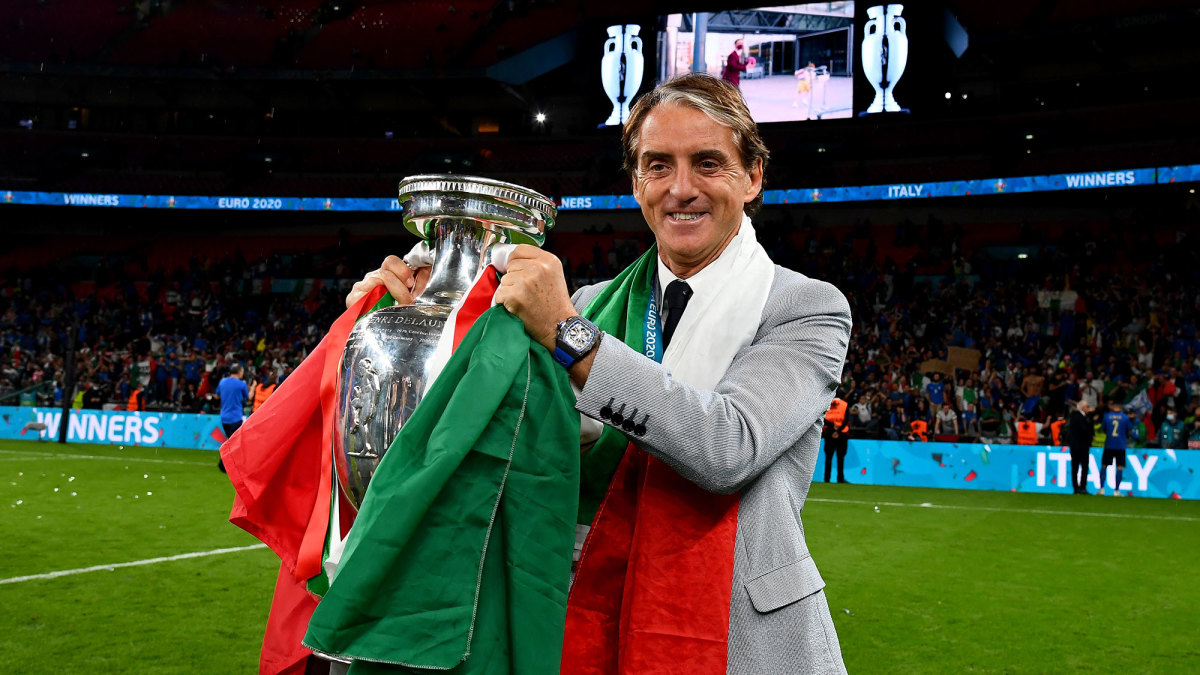
Italy has made that journey far more rapidly, quicker than seemed possible. Failure to qualify for the World Cup, the first time it had missed out in 60 years, was almost unthinkable. There was a sense, too, that Serie A was faltering: Juventus dominated, winning nine titles in a row, which is never a healthy sign. There has not been an Italian Champions League Winner since Inter in 2010, and the attritional style of that José Mourinho team made that feel very much like an underdog triumph. There was an end-of-an-era feel to it, one last hurrah for the old ways before the Pep Guardiola-inspired press-and-possess revolution.
Mancini, himself, was in the wilderness. After leading Manchester City to its first league title under Sheikh Mansour’s ownership in 2012, his career had dwindled. He’d left City at the end of the following season after a disappointing title defense and defeat in the FA Cup final to Wigan. A stint at Galatasaray and a return to Inter did not go well. Zenit Saint Petersburg always seemed like a strange choice. And then Italy’s great shame gave him his great opportunity.
He and Luis Enrique, in terms of club management, had by far the best CVs of any coaches in the tournament. It’s perhaps no surprise, then, that when facing each other, they served up such an extraordinary semifinal, a game of extremely high quality between two sides intent in passing their way to success. That has been Mancini’s triumph. He has made Italy look and feel like a club side. His players have an obvious togetherness and play with pace and mutual understanding.
There is much talk at Coverciano, Italy’s national training base, that the future of football may involve a central spine of three or four players, with no other fixed positions. In a sense, that is inherent in Arrigo Sacchi’s dictum that players should determine their positions according to four factors: the ball, the space, teammates and the opponent. Mancini’s side, of course, is at nothing like that level of fluidity, and yet the influence of the underlying idea can perhaps be discerned. That was particularly true when Leonardo Spinazzola was charging forward down the left from a notional fullback position, sometimes cutting inside of Lorenzo Insigne, sometimes outside. That Emerson, who replaced Spinazzola, never quite achieved the same level of mutual understanding, is only natural. Relationships take time to build.
As Serie A changes, there is a curious sense that Mancini and Italy represent something very rare in the modern game: a national team in the vanguard of tactical change. There are always limits because of the lack of time available, but Mancini has captured the new mood. This is very much his team. It may lack the obvious stars of some past Italy sides, but it has a coherent tactical framework, and a squad of dedicated players who buy into the philosophy. And in modern football that probably matters more. It showed in this tournament.
More Euro 2020 Coverage:
